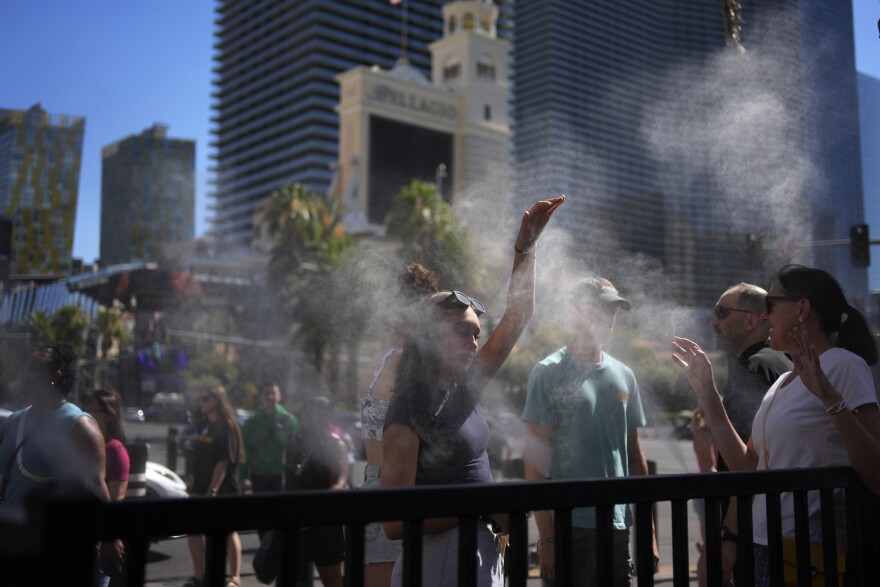Las Vegas Heat Wave: A Record-Breaking Battle Against Extreme Heat and Climate Change
This summer, Las Vegas has found itself in the relentless grip of an unprecedented heat wave, with scorching temperatures threatening daily and all-time records. As one of the hottest seasons in recent memory unfolds, this extreme weather event not only underscores the dangers of heat-related illnesses but also serves as a glaring reminder of the escalating impacts of climate change.
Record-Breaking Temperatures Sweep the City
The extreme heat wave reached its critical peak in early July, when temperatures began exceeding seasonal averages and verging on historical records. On Friday, July 5, Las Vegas saw temperatures surge to 113°F, edging close to the daily record of 116°F set in 2017. Meteorologists had already warned that this blistering heat was just the beginning.
Over the following days, Las Vegas continued to inch closer to or breach historical thresholds. On Saturday, July 6, temperatures climbed to 114°F, narrowly missing the 115°F record from 2007. However, the most staggering milestone was achieved on Sunday, July 7, when thermometers registered a jaw-dropping 120°F. This shattered the city’s previous all-time high temperature record, setting a grim new benchmark. Later in the week, the unrelenting heat persisted, with forecasts predicting and often exceeding prior daily and seasonal records, including a projected 118°F on Tuesday, July 9, and near-record highs of 116°F on Wednesday, July 10.
Such extreme temperatures make Las Vegas one of the focal points of a summer that is rewriting the climate record books, pushing the boundaries of what was once considered "extreme" into the realm of terrifying normality.
Safety Concerns Amidst Rising Heat
Prolonged heat waves aren’t just a statistical phenomenon. They are a public health crisis in the making. Recognizing the severity of this climate event, local authorities have issued an Excessive Heat Warning, urging the public to take precautionary steps to stay safe. Heat-related illnesses such as heat exhaustion or heatstroke become serious threats when temperatures rise above 110°F. Vulnerable groups, including the elderly, children, outdoor workers, and homeless individuals, are particularly at risk during such events.
Cooling stations have been established throughout the city to provide safe havens from the oppressive heat. These facilities serve as essential lifelines for those without air conditioning or adequate shelter. Additionally, health officials are reiterating basic yet critical advice—stay hydrated, avoid outdoor activities during peak heat hours, wear lightweight and breathable fabrics, and check in on neighbors and loved ones who may be especially susceptible to heat-related complications.
Yet even with these preventive measures, the long-term solutions must address more systemic environmental problems to alleviate the recurrence of such extreme weather.
Climate Change and Its Role in Extreme Heat
This blistering event in Las Vegas is not an anomaly—it’s the latest example of an alarming trend. As greenhouse gas emissions continue to rise, so do global temperatures, creating the perfect breeding ground for more frequent and more intense heat waves. According to experts at the University of Nevada, Reno, the effects of human-induced climate change have amplified the likelihood of surpassing such temperature extremes. Without significant mitigation efforts to curb emissions, the risk of these dangerous weather phenomena will only increase.
The all-time record-breaking heat of 120°F recorded on July 7 is a stark reminder of just how dramatically our climate is changing. While Las Vegas once experienced bouts of extreme heat as rare anomalies, these searing conditions are becoming more common—and more severe. The broader impacts can already be felt, from strained infrastructure to heightened health risks and greater demands on energy for cooling systems.
The Path Forward: Awareness and Climate Action
The current heat wave gripping Las Vegas is a sobering wake-up call. As temperatures stay dangerously high, education and awareness about heat safety are more critical than ever. Residents and visitors alike must take steps to protect themselves while also recognizing that this event is part of a larger environmental issue. Community efforts, government intervention, and access to health resources during heat waves play an integral role in safeguarding public health. The activation of cooling stations and consistent communication about risks are helping mitigate the immediate threats. However, addressing the root causes goes far beyond localized responses.
The extreme heat in Las Vegas underscores the urgent need for comprehensive action on climate change. Reducing greenhouse gas emissions and transitioning to renewable energy sources are no longer abstract ideas for the distant future—they are essential to preventing the worsening of life-threatening weather patterns. Policies that support sustainability, green infrastructure, and climate resilience must take precedence to stave off further damage.
As Las Vegas battles through this record-breaking heat, it serves as both a cautionary tale and a rallying cry. The sweltering temperatures are a reminder of what’s at stake—not just for one city, but for the planet as a whole. By taking bold steps now, we can ensure that future generations inherit a world that is both livable and sustainable. The time for action is now.
